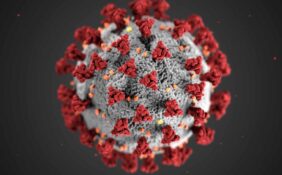Coronavirus: Should You Stop Trying to Conceive Because of COVID-19?
Here at Ava, we take data—especially fertility and pregnancy data—very seriously. Our team is led by premier data scientists, obstetricians, gynecologists, and reproductive endocrinologists, many of whom hold PhDs and decades of experience in their respective fields. So, when you read content on AvaWorld, you can trust that it’s backed by science and has been thoroughly researched and vetted by our experts.

Essential Takeaways
- Early research suggests you probably won’t pass COVID-19 to your fetus or newborn
- Avoid getting pregnant if you’ve been exposed to coronavirus
- The pandemic may restrict access to prenatal care
If you were trying to conceive, should that change because of the coronavirus pandemic? In the last few weeks, news of coronavirus — and anxiety about what the global pandemic means to our lives and health — has claimed nearly every waking hour. There is tremendous uncertainty in everything these days, and that’s especially true if you’re trying to conceive or have a baby already on the way.
Does coronavirus affect your ability to get pregnant? Should you stop trying to conceive at a time like this? Read on for a breakdown of up-to-the-minute information on everything that doctors and scientists know so far about COVID-19 — as the disease caused by coronavirus is known — and its possible effect on fertility and maternal and fetal health. We’re here to arm you with information so you can decide whether you want to stop trying to conceive.
What is coronavirus and COVID-19?
On March 11, the World Health Organization declared the coronavirus outbreak a global pandemic. The virus behind the current pandemic is part of a family of coronaviruses. It’s related to two coronaviruses that caused serious outbreaks — severe acute respiratory syndrome coronavirus (SARS-CoV) and the Middle East respiratory syndrome coronavirus (MERS-CoVs). But the novel coronavirus appears much less severe and deadly.
COVID-19 infects the lower respiratory tract. Patients initially develop a fever, cough, and aches; Other symptoms include sore throat, headaches, and nausea.
The average age of patients hospitalized with COVID-19 is 49 – 56, and up to half had an underlying illness. Most patients (54 – 73%) are men, although scientists aren’t sure why.
Does COVID-19 affect fertility?
We have so little information right now that it’s impossible to know. View anything you read online about COVID-19 and fertility with a healthy dose of skepticism at this juncture.
For example, research posted online by a fertility center in Wuhan, the epicenter of the outbreak, suggested COVID-19 might cause an immune response in men that inflamed the testicles and potentially lowered sperm count. But the Chinese government quickly deleted the post, making it impossible to dig into the research, much less draw any meaningful conclusions.
Reputable medical bodies, such as the American College of Obstetricians and Gynecologists and the CDC, have so far come out with no information about the possible fertility effects of COVID-19.
Should I stop trying to conceive because of coronavirus?
Ultimately, this is an extremely personal decision. Although it’s difficult to predict how long the pandemic will last, social, economic, and healthcare disruptions are becoming the new normal — and may be with us for some time.
Dr. Eleni Greenwood Jaswa, a reproductive endocrinologist and fertility specialist at UCSF, says, “the decision comes down to one’s personal risk tolerance in the absence of information.” We don’t have a lot of information right now, she explains, but we “can’t conflate the absence of data with the absence of risk. The safest thing to do is wait a few months until we have more data.”
ACOG anticipates shortages in healthcare workers, protective gear, isolation rooms, and medical supplies. The pandemic may make it harder to access prenatal care. ACOG is advising OB/GYNs to use telemedicine to provide prenatal care wherever possible, given the anticipated shortages and to reduce the risk of transmission.
It’s worth noting here that during the SARS outbreak, some hospitals suspended obstetric services they considered non-essential, such as routine ultrasounds. Generally, pregnant women visit their doctors more often, and we might see some of the same limitations with COVID-19.
Should I stop trying if I’ve been around someone with COVID-19?
If you think you’ve been exposed to COVID-19, if you have some of the symptoms, or you already have it, avoid getting pregnant right now, recommends a recent bulletin from the American Society for Reproductive Medicine. These same recommendations also apply if you’re planning to use an egg or sperm donor to conceive or a surrogate to carry the pregnancy.
ASRM further recommends that women who are diagnosed with coronavirus while undergoing infertility treatment consider freezing all their eggs or embryos. ASRM also suggests holding off on transferring embryos until a doctor has cleared you of COVID-19.
Am I more prone to get COVID-19 if I’m pregnant?
Pregnant women are an “at-risk population” for COVID-19 based on what we know about similar coronavirus outbreaks (SARS and MERS) in the past, and because of the way that pregnancy suppresses the immune system, noted ACOG in a new bulletin last week.
As The Lancet further explained, “pregnant women are susceptible to respiratory pathogens and to development of severe pneumonia, which possibly makes them more susceptible to COVID-19 infection than the general population, especially if they have chronic diseases or maternal complications.”
Pregnancy suppresses the immune system and causes physiological changes (increased oxygen consumption, elevated diaphragm) that make pregnant women particularly susceptible to respiratory pathogens and severe pneumonia.
If you’re pregnant or become pregnant, you should always take more precautions around issues like the flu — and the recent coronavirus outbreak serves to underscore the importance of erring on the safe side when it comes to your health. Avoid crowds and practice good health hygiene and social distancing.
All that being said, the data we have so far about pregnant women who have contracted COVID-19 is reassuring: there does no seem to be any specific risks to pregnant women. Emily Oster, an economics professor at Brown University, said, “I think that if it were very serious for pregnant women, we would know by now, because there have been a large number of COVID-19 cases.”
Could the pandemic affect my delivery?
Using the past as a guide, it probably will. During the SARS outbreak, for example, hospitals severely limited the number of visitors in an effort to control the contagion. Patients could have only one person present during labor and delivery; No visitors were allowed after delivery.
Women who gave birth were sent home more quickly than usual and also asked to quarantine themselves for 10 days — even if they showed no symptoms and hadn’t tested positive for SARS.
Can I pass COVID-19 to my fetus or newborn?
The short answer: It doesn’t look like it, but we don’t know yet.
A small study of just nine pregnant women in China’s Wuhan region who tested positive for coronavirus found no evidence that the virus passed in utero from the mothers to the fetuses.
The nine women were all in their third trimester when they were diagnosed, according to research published in The Lancet last month. They had the same type of symptoms as non-pregnant individuals with COVID-19. Their most common symptoms were fever and cough, and all also got pneumonia.
The women had cesarean deliveries and gave birth to 10 babies total (one woman had twins). Six of the infants were premature and four were full-term.
When doctors performed lab tests on six of the mothers and their newborns (we don’t know why they didn’t test all of them) in the operating room, they found no evidence of coronavirus in the cord blood, amniotic fluid, or throat swabs from the newborns. The virus also wasn’t found in breast milk.
That said, you may have seen a recent news report about a one-day-old who was diagnosed with COVID-19. The story, which appeared in Chinese state media and in the news here, was the first report that we know of that seems to show vertical transmission.
Vertical transmission is when a mother passes a pathogen (coronavirus, in this case) to her fetus or newborn via the placenta, in breast milk, or through direct contact during or after childbirth.
However, as researchers in The Lancet note, the infected newborn’s “throat swab sample was collected approximately 30 hours after birth, thus providing no direct evidence for intrauterine infection.”
The bottom line right now: “Currently no evidence” you can pass COVID-19 to your fetus or newborn.
Could COVID-19 harm my newborn?
From what we know so far, it might. Research on those 10 Chinese newborns and their mothers showed COVID-19 was linked to premature labor and affected the health of the newborns, causing:
- Fetal distress
- Respiratory distress
- Thrombocytopenia (low platelet levels)
- Abnormal liver function
All newborns were hospitalized. Sadly, one baby died.
But again, this is a tiny sample, providing us with very little information to go on. Much much more research needs to be done to fully understand the effects of COVID-19 on maternal and fetal health.
View sources











